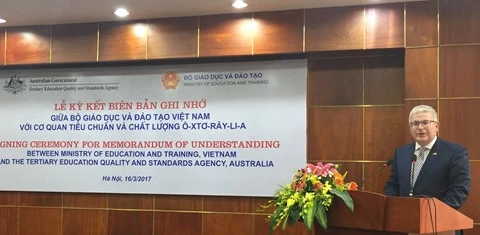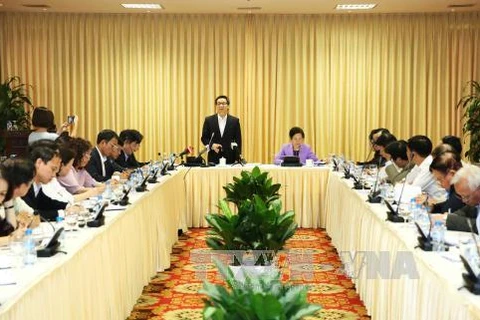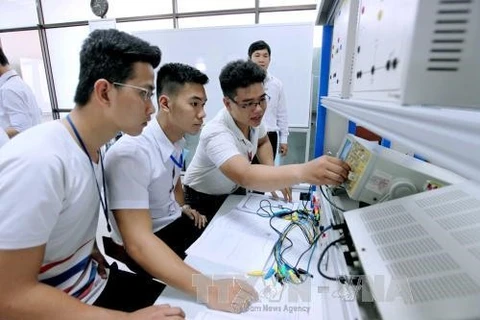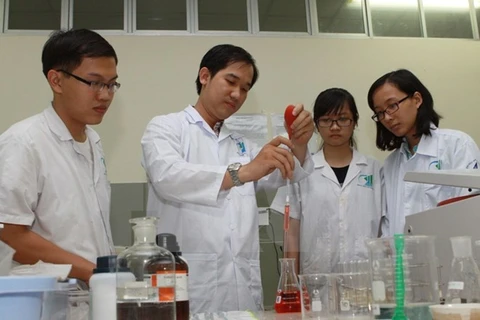 Students of the Thai Nguyen Medical School in the northern province of the same name attend a class under the "Smart school" initiative aimed at reforming medical education in the country (Photo: VNA)
Students of the Thai Nguyen Medical School in the northern province of the same name attend a class under the "Smart school" initiative aimed at reforming medical education in the country (Photo: VNA) HCM City (VNA) - In Vietnam, getting into a university has been described as a national obsession and getting admission seen as a cut-throat competition. However, despite getting through such a tough initiation, more students are failing to stay in college until graduation, and the steady increase in their numbers is worrying educators.
Several factors, including expulsion, dropping out, transferring and repeating courses are said to be the prime causes behind this phenomenon.
In June 2016, the Ho Chi Minh City Agriculture and Forestry University surprisingly expelled as many as 946 students, many of them are those who’d already completed three of eight terms. The university said the decision was not taken lightly.
“All the expelled students were those who’d received three academic warnings. This school puts an emphasis on education quality. If the students fail to invest their efforts into studying, then expulsion is in order,” said Tran Dinh Ly, head of the university’s training department.
Prior to this “serial expulsion,” the university had already issued warnings to 1,937 students – 1,614 received their first and 323 their second.
In 2016 March, the HCM City University of Social Sciences and Humanities under the Vietnam National University HCM City let go of 214 students, citing repeated failures to obtain minimum credits in a term, those whose average score in tests in the first term or in two consecutive terms were below 3.0 and 4.0, respectively.
Ly estimated that 15-20 per cent of students in the university won’t make it to the final year.
“It means that if the 2017’s enrollment target is 5,200 students, after four years, by 2021, there will be about only 4,000 students left in the senior year,” he said.
Similarly, the HCM City University of Food Industry reported a 15-20 percent “loss” in the number of students, with the head of its training department saying that besides the majority of expulsions, other factors included students having chosen wrong majors or schools or falling way behind the lessons.
The rate of dropouts at the HCM City University of Polytechnics is as high as 30 percent, according to Le Chi Thong, head of its training department.
At the HCM City Open University, the number of students managing to graduate in time (in four years) is just 50 per cent.
Universities in Hanoi have similar stories to tell.
The Hanoi University of Education, for example, expelled 620 students and issued warnings to 1,076 during the 2013-2017 period.
The Hanoi University of Industry reported that 10 percent students who enrolled in 2014 – 555 – have received warnings over poor grades. In 2015, this number rose to 576 students, or 7.9 percent, but in 2016, the figure dropped to 268 students, or 4.2 percent of the total number of students. However, in these three academic years, 634 have been expelled. Over four years, the rate of expulsion was around 9-10 percent for each class.
Pham Thai Son, deputy head of the training department at HCM City University of Food Industry, said the situation requires both the universities and the students to “take a serious look at themselves.”
“On our part, the number of students in each class will no longer be the same, affecting our revenue. No school can prepare its education programme factoring in the expulsion of a large number of students, but this can’t be avoided,” he told the Vietnamnet newspaper.
“If the reason for leaving is because the school is just their (students’) secondary choice in application, then we will surely try to improve our education quality and brand. If the reason is harsh assessments that make it difficult for students to adapt, we will review our education and training work,” Son said.
He also said that students who drop out of school or get expelled after a year of study are doing themselves a disservice.
“A lot of money and time has been spent and wasted for nothing. Especially, in Vietnam, where online education or degree obtained via part-time courses while working are not highly valued, they will have to start from zero again.”
He said those expelled in their third or fourth year are mostly those that could not follow the curriculum, or “to be honest, they are lazy and their excuses are ‘life difficulties.’”
“Once expelled, the chance that they will seek university education again is slim to none,” he said.
The problem has drawn many views and opinions from education experts who mostly attribute it to inappropriate policies and lack of proper attention from universities, while admonishing students to realise that “no one else can study for them.”
Do Van Dung, Rector of the HCM City University of Technology and Education, one of the policy critics, explained: “First, the school’s tuition policy. Currently, tuition is rising as public universities’ autonomy is encouraged. Without financial means, students will have to work part-time and neglect their studies.
“Second, student loans can only satisfy a very small portion of the real demand. Third, the uncontrolled multi-marketing schemes that promise huge profits are irresistible for some students.”
Dung also warned that worried about declining revenues, some schools have told teachers to not grade failing scores that would force the school to expel underperforming students.
Hoang Ngoc Vinh, former head of the professional education department und the Ministry of Education and Training, blamed the low scores on students adopting a “relaxed attitude” after a hectic, high pressure period preparing for the university entrance exams.
He said counselling and other forms of assistance to help students adapt to university life and various other aspects like homework, thesis writing, or credit system is lacking in most universities because they are “already too busy with student recruitment and financial burdens.”
Tran Anh Tuan, Deputy Director of the HCM City Centre for Forecasting Manpower Needs and Labour Market, said this current situation was the result of “75 per cent of high school students having insufficient understanding of majors in universities.”
Career orientation is only popular in urban areas. In rural areas, it is almost non-existent,” Tuan said, citing several surveys done by his organisation.
Dam Quang Minh, rector of the private Thanh Tay (Western University), did not see reasons to get unduly worried.
He said more studies are needed to see the actual rate as well as reasons for dropping out of university education – whether it was to change majors, switch to another university, overseas study, financial problems or others.
Minh said that in American universities, only 55 percent of students graduate and the rate of students pulling out in the middle of the school-year is around 30 percent.-VNA
























